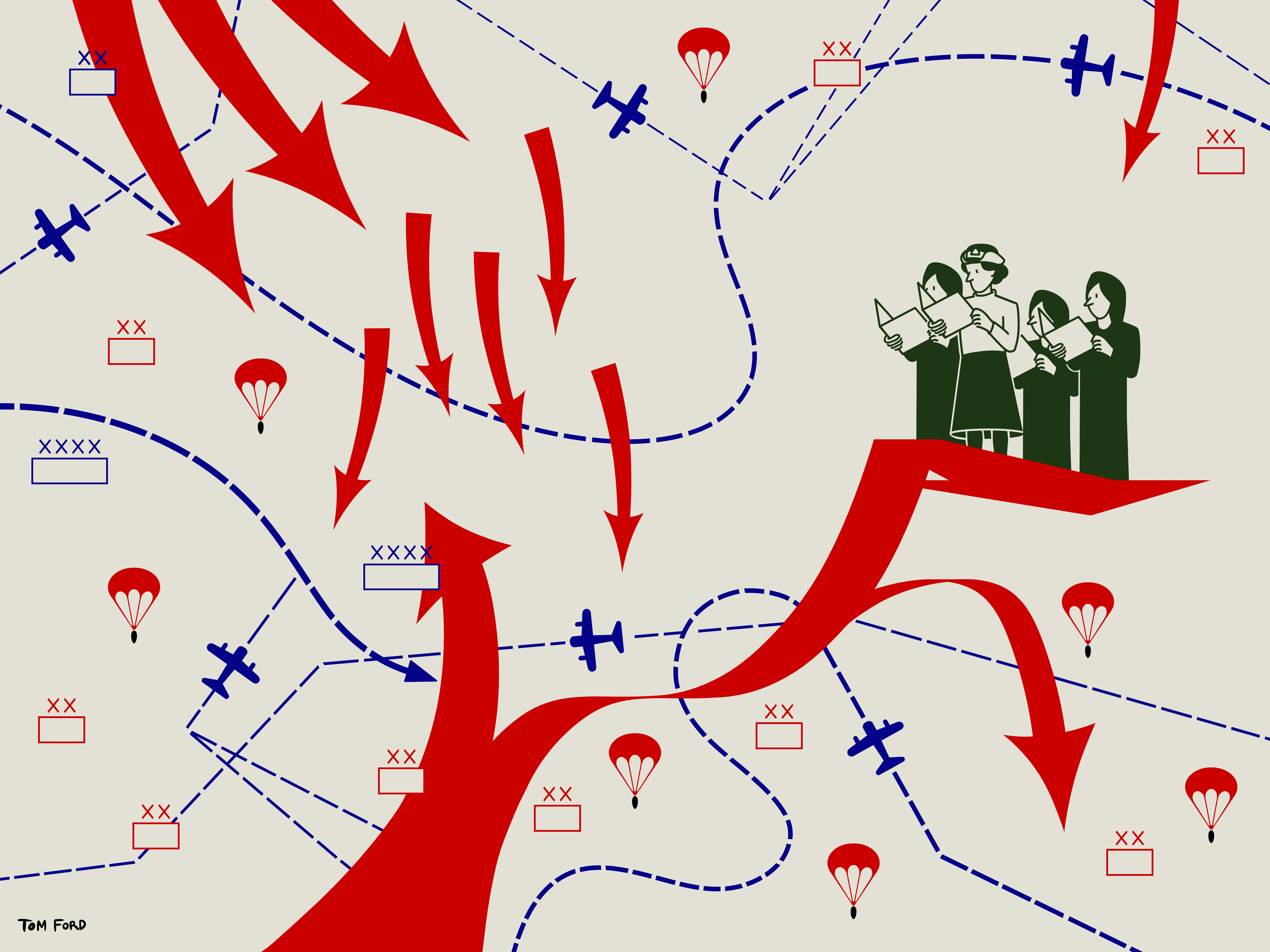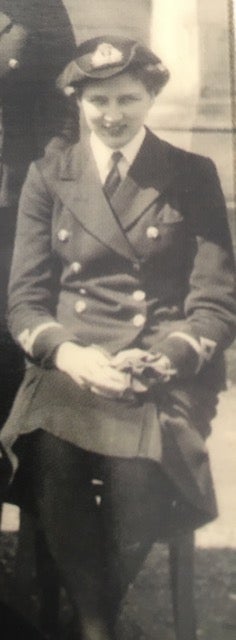Christian Lamb believes everyone should have the chance to hear Handel’s Messiah
I can’t read or do anything else while I’m listening to it. I have to give it my full attention – 100-year-old Christian Lamb tells Christine Manby


This was nearly Christian Lamb’s second pandemic. Born at the tail end of the Spanish flu, Lamb recently marked her 100th birthday with a series of socially distanced celebrations. Her life so far has been a series of adventures. In 1939, at the age of 18, she was spending a year in France ahead of going to university when her father called her back to the UK. “I hadn’t read the papers so I had no idea what was going on,” she says lightly, as we sit and drink tea. But with her father an admiral in the royal navy, of course Lamb would do her bit for the war effort. Having quickly been taught to drive by her grandmother’s chauffeur, Lamb enrolled in the Women’s royal navy. As the title of one of her books puts it, “I only joined for the hat”.
Training in London during the Blitz did not dent Lamb’s youthful confidence. “I didn’t for one moment think I was going to be blown up.” Though she had a few close shaves. Catching the number 13 bus back to the “Wrennery” one evening, Lamb and her friends hopped off several stops early to see a film on Baker Street. The following morning, taking the same route in reverse, they found the cinema had completely disappeared. Later, a stick of bombs fell on the road where she and her fellow Wrens were living, devastating the houses opposite with many lives lost.
Lamb was subsequently appointed to the Coalhouse Fort in Tilbury, where she worked as degaussing recorder in charge. Degaussing is the process of decreasing an object’s magnetic field. In this case, the navy was degaussing ships so they wouldn’t attract magnetic mines. Later, she was appointed to be a plotting officer in Plymouth and then in Belfast, earning the rank of third officer WRNS and the right to wear the tricorn hat she jokes attracted her to the service. She met her future husband, Lieutenant Commander John Lamb DSC, when his ship was in Belfast for repairs. After a 10-day courtship, they became engaged and Lieutenant Commander Lamb went back to sea on HMS Oribi. Lamb was among the plotting officers who took down signals as Oribi escorted the ill-fated convoy ONS-5 to the US at the height of the Atlantic Battle.
It was a tense assignment. The convoy ran into a “wolf pack” of U-boats. Out of 43 ships, 12 were lost. HMS Oribi lost her prow when she rammed a U-boat but managed to limp as far as Boston.
“It was quite a drama for me and all my friends, who had tried to keep me from being glued to the plot,” says Lamb. “But of course I had to see what was happening relying only on signals going to and fro.”
The moment Lieutenant Commander Lamb was back in the UK they were married. The wedding cake was made from the pooled dried fruit rations of their families and friends. Earlier this year, Searcys, who made the original wedding cake, created another cake for Lamb’s personal centenary.
In 1944, Lamb remained in London to work on the maps of the planned D-Day landings. “There many of us working on individual pieces of the enormous jigsaw, none of us knew or ever discussed what the others were doing … my particular brief was to delineate everything that could be seen on every compass bearing from each landing position visible from the bridge of an approaching landing craft.
“Big-scale Ordnance survey maps were spread out on the wall and showed railways, roads, churches, castles and every possible feature to an incoming invader and from every angle … D-Day happened on 6 June 1944 and when at 6am I heard the announcement on the radio I was thrilled to know that at last we had managed to carry out the plans, which had been envisaged for so long by so many brilliant brains.”

The war work Lamb undertook was “intense and exciting” but there were moments of levity too. “I’ve always loved music,” she says. “As a child I played the piano. As a WRN, I carried my gramophone with me everywhere I went and joined a WRN choir singing Bach.”
Raising her children as the family travelled to Singapore and Malta with her husband’s postwar work made it hard to keep playing or singing but once Lamb’s children had all left home, she took an Open University degree on the Age of Enlightenment which rekindled her love for music again, especially for Haydn and for Handel.
Handel’s Messiah is the piece of music Lamb thinks everyone should have the chance to hear. “I love everything by Handel,” she says. But it was the opportunity to perform in at the Royal Albert Hall in her eighties which cemented Messiah as Lamb’s favourite. She tells the story.
“The Albert Hall has two huge choirs and every year they take fifty extras. A friend suggested that I apply to be one of them. I didn’t think it was possible. ‘I’m much too hopeless at singing,’ I told her. ‘Can you read music?’ she asked me. I said I could, so she told me to call them up and ask. I don’t suppose they’d ever had anybody so old ring up. I just had to send £10 and I was in. I was delighted when I heard I was going to be in the chorus for Handel’s Messiah as one of the altos. I rushed straight out to buy the score.”
I can’t read or do anything else while I’m listening to it. I have to give it my full attention
George Frideric Handel was born in Halle, Germany. He was a musical prodigy, composing his first opera, Almira, while still a teenager. In his twenties, he worked all across Italy and Germany as a musician and composer, attracting the patronage of the future King George I of England. He moved to London in 1712, aged 27, and set up three opera companies to supply the English nobility’s passion for the genre. By the 1730s, however, Handel had grown tired of opera and turned his attention instead to religious oratorios. They cost far less to produce.
Messiah, with its famous “Hallelujah Chorus”, was written at astonishing speed. Writing round the clock, Handel completed the score in less than a month. The libretto was written by Charles Jennens and Messiah had its premiere at the Musick Hall in Dublin on 13 April 1742. In order to accommodate as large an audience as possible, female guests were asked to wear dresses without hoops. Gentlemen were asked to leave their swords at home.
There were no hooped skirts or swords in the Royal Albert Hall on the night Lamb took her place in the choir but the house was packed, Messiah’s popularity not having waned one bit in two and a half centuries. She recalls waiting for the performance to begin, “We were below the stage in an enormous room. We had to bring a picnic supper. I made several friends in the choir but when we filed onto the stage, I made sure that I was situated behind a girl with a very good voice to compensate for mine!”
“It was really exciting to be behind the orchestra and soloists and experience everything from that perspective. Such a privilege. The Hall was packed. The soloists sang movingly. When the performance was finished, the applause was very dramatic. The second night was even more enjoyable. The soloists were better and that lifted us all. It was one of the most wonderful experiences of my life. Absolutely magical.”
Though she no longer sings in a choir, Lamb still makes time for Handel. “Occasionally I listen to Messiah and follow along with the score. I can’t read or do anything else while I’m listening to it. I have to give it my full attention.”
Though she now has “a century in hand” as she puts it, Lamb hasn’t closed herself off to other new experiences either. She takes a daily walk and the camellias on her balcony are thriving. She is something of an expert on camellias. She has written books on famous plant collectors and the world’s best botanic gardens. She has appeared on Gardeners’ Question Time. She has plans to publish her first memoir and is also researching the history of cochineal, which has a connection to her hero, Sir Joseph Banks, the English naturalist.
Perhaps she should start a blog? I suggest. She reminds me that she already has a website (christianlamb.co.uk). “There can’t be many 100-year-olds who do.” Only recently, she has learnt to paint, inspired by the Thames which passes right beneath her window. She’s just finished a series of paintings of fish owls. “They eat only fish, of course. They like eels. Do you know much about eels?” she asks me. She moots the possibility of writing something about eels too.
Walking home from our meeting, with the “Hallelujah Chorus” playing on my phone, I see the world through Lamb’s eyes. My mind is full of U-boats and hoop skirts and the mysterious lives of eels. There is so much to know and to learn. Another hundred years would not be enough.




Join our commenting forum
Join thought-provoking conversations, follow other Independent readers and see their replies
Comments